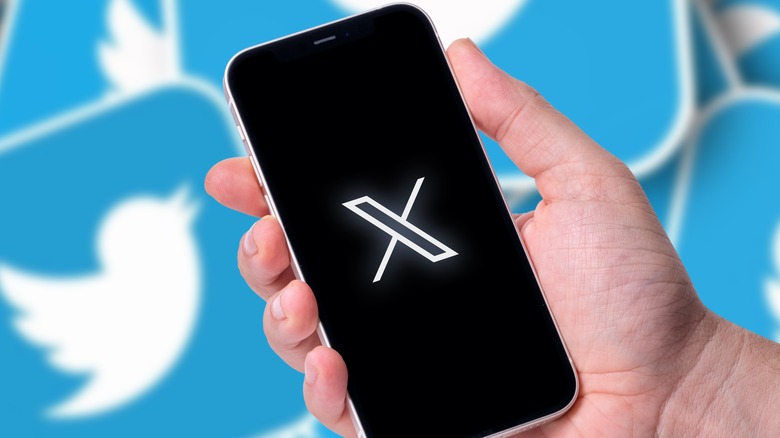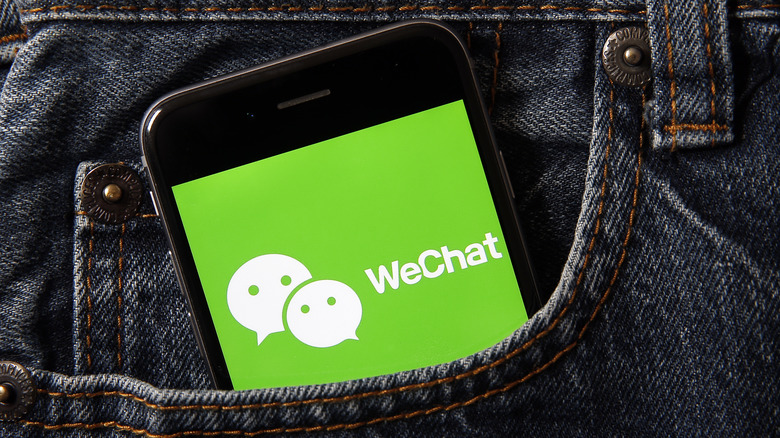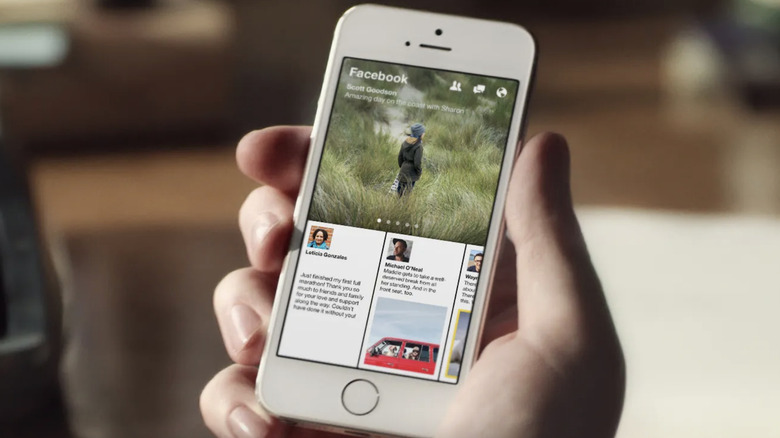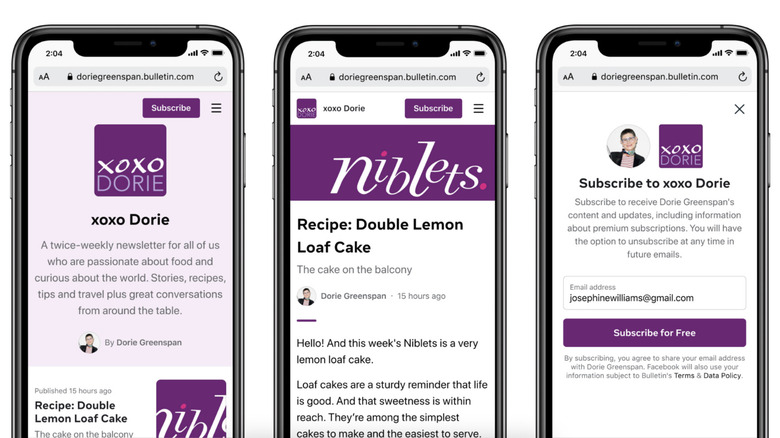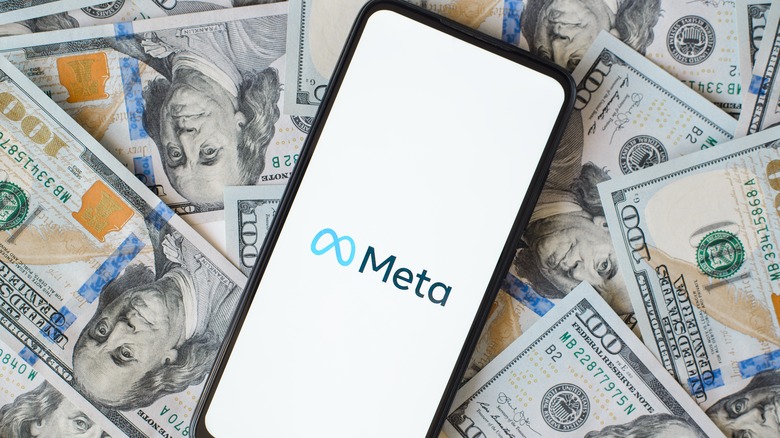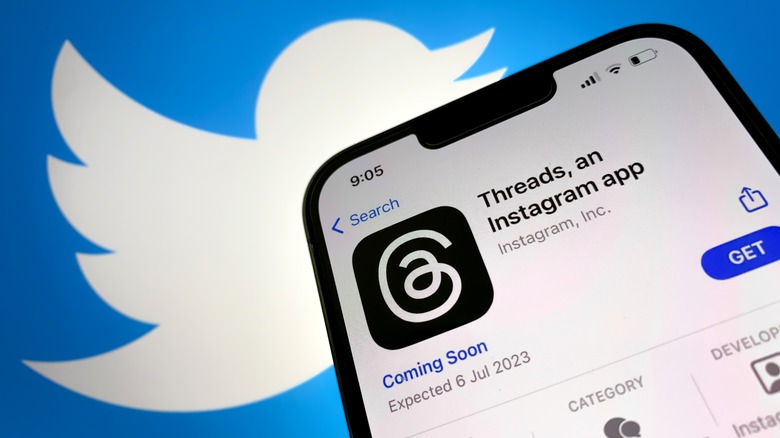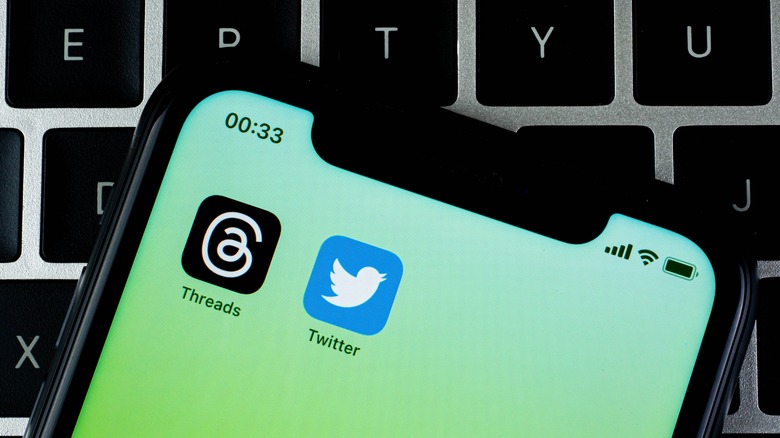Facebook Already Tried Elon Musk's Plan For Twitter And It Didn't Work
The Twitter logo has metamorphosed into X, in what seems to be the first step in its goal of becoming an everything app. The Elon Musk-owned social media company is trying to imitate the formula of WeChat, the Chinese messaging app that allows everything from mobile payments and cab hailing to even filing for a divorce online. Twitter CEO Linda Yaccarino also seems stoked about Musk's vision, but those sky-high ambitions might not necessarily translate into the kind of thunderous success that Musk dreams of.
The best living example of failure to create an "everything" platform would be Facebook, which is currently busy trying to steal the limelight away from Twitter with its own Instagram-linked clone called Threads. In fact, Facebook has killed enough features and failed at successfully executing more ideas than Twitter has ever experimented with.
In addition to toying with a smorgasbord of doomed features, Facebook also tried a ton of spin-off apps. But none of them caught on, despite commanding the world's largest social media audience at any given point in time. Interestingly, a lot of ideas that Musk's Twitter is currently trying to push into the mainstream are either living in obscurity on Facebook or have been abandoned years ago.
Musk is seemingly attempting what Facebook tried, repeatedly, and failed over the years. But the allure of aping WeChat is too lucrative to let go, especially when the scope of growth — and making a filthy amount of money — is seemingly endless.
What is WeChat?
WeChat, owned by Chinese tech and gaming conglomerate Tencent, is a communication app that blends everything from texting and social media to payments and gaming. The app has over a billion users, but its core stomping ground is China. Let's start with the basics and where it draws parallels with Instagram, WhatsApp, Facebook, and Twitter.
At its core, WeChat is a messaging app. You can communicate with your acquaintances using text messages, send them photos and videos, or engage in voice or video calls. You can add new people to your contact pool with their phone number, a unique user ID, or by scanning their profile QR code.
Then there's the social aspect to it. The "Moments" feature in the app lets you upload photos and videos, and your contacts can react to it, just like Instagram. There's also a "Shake" feature that lets you find people nearby and get in touch with them, sort of like dating apps.
WeChat Pay is the payment system powering the app's financial tools. You can find a shopkeeper's unique WeChat Pay QR code, or they can scan yours, to facilitate payments. There's also a peer-to-peer payments system that lets you send money to contacts.
Then there are mini-apps, which turn WeChat into an app ecosystem of its own. Almost every major brand has a mini-app that you can find within WeChat. You can book cabs, order food, pay for travel, play games, find jobs, and shop online.
Copy fast, fail faster
Over the years, Facebook has tried to expand beyond its core conceit — but its legacy is littered with failures. After becoming the premier social network in the late aughts, it turned its attention to Quora and thought of expanding its reach to become a knowledge bank. The result was Facebook Questions, which launched in 2010 with a neat polling feature and was aggressively pushed to Groups and Pages. In 2012, Facebook announced the death of its ambitious Quora killer.
In 2014, the Mark Zuckerberg-led company announced Facebook Paper, an algorithmically curated feed of full-screen news articles. Essentially, it was a newspaper on phones. Two years into an obscure life, it rode into the sunset. In 2015, Facebook introduced M, a personal assistant that was available as a bot and combined AI with real human assistance. Three years later, it was shut down. Interestingly, Elon Musk now runs a generative AI company called xAI and has said it will work closely with Twitter. This is quite some evolutionary social AI déjà vu.
Facebook even turned its attention to the East and saw influencers selling millions of dollars worth of products via live streams. Thus, Facebook Live Shopping was born in 2018 and became publicly available in 2020. In August 2022, Facebook announced that it is pulling the ability to host live shopping sessions for creators.
2020 saw the launch of Facebook Campus, a space within the core Facebook platform where college students could interact with their campus friends and peers. Dubbed the "reinvention of Facebook," the initiative was ditched in 2022. In 2021, it again tried to re-invent its social appeal with Neighborhoods, allowing members of a local community to find and interact with each other. The idea was inspired by Nextdoor, but the hyperlocal social connectivity tool met its demise just two years later.
Twitter is chasing Meta's failed neo-journalism
In the same phase, Meta — the new name for Facebook's parent company — also noticed an alternative form of blogging and journalism emerge. The world knows of it as newsletters, and Substack led the race. Facebook, the ever-enthusiastic brand known for taking generous inspiration from others, launched its own newsletter product called Bulletin in 2021.
The idea was to let writers publish newsletters and even create standalone websites. Bulletin even came bundled with analytics tools and Facebook News integration. Late in 2022, Meta announced that Bulletin would shut down in 2023 after pouring in millions of dollars. Twitter could learn a lesson, or two, here.
Twitter acquired Revue, a newsletter platform, a few years ago. Then came Elon Musk, and the newsletter bit was dead. Musk then brought it back as a Twitter Blue perk, allowing users to post long-form articles, complete with the ability to add in-line media assets. And if the audience happens to be large enough, the creator will earn a cut of revenue from ads appearing in the comments section.
Musk has repeatedly expressed his desire to turn Twitter into a haven for creators, but his ideological inclinations haven't been universally popular, especially among journalists and writers that form the backbone of any newsletter business. The research community has also warned about declining standards of content moderation and the rise in toxicity, which is a sure-shot way to deter talent willing to explore Twitter as a publishing platform for their work.
Payments are a risky venture
In a bid to further emulate WeChat's model, Facebook dipped its toes into the world of mobile payments in 2015. It introduced a peer-to-peer payment system that would let users send money to friends and family members without having to pay any extra fee. A few years later, the payment facility was integrated into the core Facebook platform, Instagram, and even WhatsApp.
But Facebook Pay has failed to make the kind of impact that a platform with billions of users should have. Facebook's shady reputation with user privacy and data safety played a crucial role here. Why would users trust a company that even wanted to store and sell their facial recognition scans? Facebook hasn't given up on those ambitions yet, but it has already tasted a massive setback.
The company worked on its Diem cryptocurrency project for years, then denigrated it to a wallet status, and finally sold off the assets. Regulators weren't convinced about the whole idea, and market trust in Facebook wasn't too favorable either. Twitter has only dabbled with NFTs so far, but Elon Musk wants to turn it into a financial services hotspot.
That's easier said than done. With massive loans to pay off, waning user trust, and still far away from a cash-positive revenue flow, Musk will have a hard time convincing stakeholders to help build a payments infrastructure for X. Plus, rules around local data storage in markets like the EU will take its own sweet time to address.
History is not kind to app copycats
As Elon Musk tries to expand Twitter into an "everything app," it will no doubt encroach on the territory of existing apps with established user bases. Facebook is no stranger in that arena, having launched a dozen or so copycat apps over the years.
It first copied Snapchat with Poke, but that vanished within two years. Vine imposter Riff arrived with a lot of promise and went away. Facebook bought the company behind motion tracking app Moves in 2014 but shut it down in 2018, alongside two other apps named Hello and TBH. Facebook once again cloned Snapchat with an app called Slingshot but folded it just a year later alongside two more apps called Rooms and Riff.
Meta also tried offering a secure way to share photos with friends, creating an app called Moments in 2015 to fill that gap. In 2019, Moments breathed its last and made its way to the 'Facebook Graveyard.' In 2016, the company released an app exclusively for users under 21 years of age, but it was pulled just a year into its existence.
As Facebook's obsession with Snapchat waned with the arrival of TikTok, a copycat called Lasso was launched in 2018. Facebook sunsetted it in 2020. Simultaneously, the company pulled the plugs on the Pinterest wannabe app Hobbi. The same year, Facebook launched an app called Tuned that was targeted at couples but discontinued it just two years later.
The company also aped Cameo with Super, but 2022 saw that app getting discontinued as well. A video-driven speed dating app called Sparked arrived in 2021, but it too was condemned to early death in 2022.
Trickiest test for Musk's wits
Meta has what you would call a commitment problem. The platform has kept innovating and adding new tools at a brisk pace but has also abandoned them mercilessly over the years. In addition to features, the company has tried to jump on hot trends by launching copycat apps, but none of them left a lasting impression and faded away. But that doesn't mean Meta has stopped trying.
On the contrary, Meta has merely shifted its attention toward WhatsApp, a property that is far less controversial than Facebook to experiment with. The messaging app already has a business side to it with shopping tools. There's already a peer-to-peer payments system in place. And to build communities, a broadcasting feature has also arrived.
Twitter wants to try a similar formula. Instead of relentlessly adding features and failing, Twitter and Meta are now looking at a niche and then taking its core functional appeal to develop a feature. It's a safer strategy but not foolproof. Both companies still see their existing products as a ripe platform with hundreds of millions of users, ready to lap up any feature they dish out.
That approach rarely works. But more than course correction, they are now facing a much tighter regulatory framework and a deteriorating reputation. Elon Musk has managed to not just annoy users but has also angered investors. Needless to say, the road ahead for Twitter is thorny at best.
Risks and rewards
Elon Musk has all the motivation he needs to turn Twitter into X, an everything app. From saving a sinking ship that is Twitter right now to turning it into a do-it-all powerhouse, there's no reason to not enter the fiery pit of experimentation and feature innovation. But there are hurdles, including one from Meta.
As we've highlighted in the past, Meta owns the trademark rights to a logo based on the letter "X." Notably, Meta's patent description covers the same online entertainment domain(s) in which Musk's X Corp operates. It's unclear whether Meta will go after X in court, but after blatantly copying Twitter with a clone app called Threads, there is little reason that Meta at least won't think about it.
Then, there's the market situation. When one single company commands overwhelming control over your life, it's never a good sign. Meta is the best example here. The privacy-adjacent and direct disastrous impact on the lives of people will definitely worry regulators about the prospects of a super app, irrespective of whether it comes from Meta or X Corp. There's a reason divestitures happen, with the latest example being Meta undoing its Giphy acquisition.
On the bright side, when two giants compete, they spur the pace of innovation, which is always good for the average digital citizen of this world. While new features would definitely enrich our digital experiences, price cuts to stay competitive will also benefit the average internet user across the globe.
